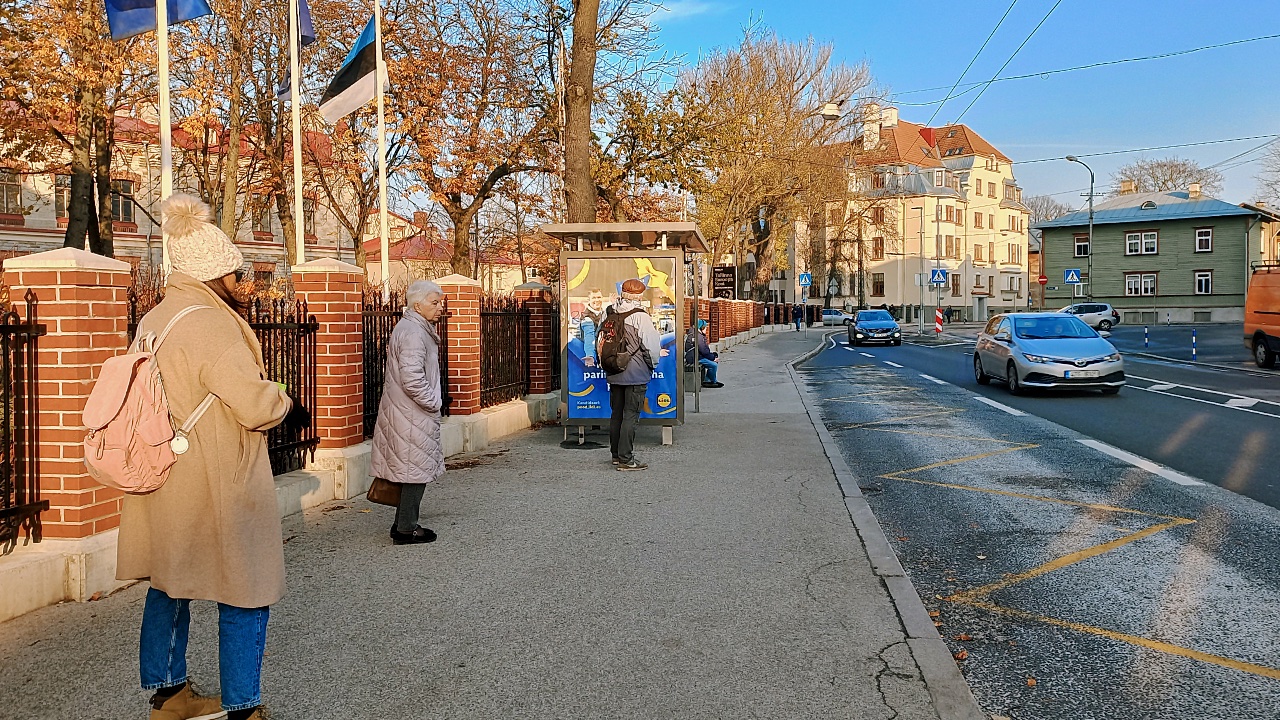
- 4/29/2022
- 10 min read
Social Interaction And The Culture In Estonia
Social interaction is social relationships between an individual to another individual, an individual to a group, and a group to another group. We as humans will always perform social interactions wherever we are since we are social creatures. It’s very rare for a person to live without other people’s help at all.
For me who migrated from a country whose climate is tropical, warm, and densely populated to a country in the Northern Hemisphere that is cold and quiet - I of course faced challenges when interacting with the locals. Estonian people have a culture that is very different from Indonesian, so the way they interact is also different. As an immigrant, I need to understand that to integrate well.
“Where the earth is stepped on, there the sky is upheld.”
These are some of the things I learned so far based on my observation and personal experience, either in public spaces or work environments. These might be useful if you have an opportunity to visit or move to Estonia so that it won’t be too shocking for you.

Very rarely smiling
When I was a child, I was taught by my mother to keep smiling whenever I meet other people. “So you became friendly and not coming across as arrogant”, she said. As an adult, I always smile at everyone. Come to think of it, that’s what the majority of Indonesians do, isn’t it? Whenever we walk and make eye contact with other people, both parties will smile as a common response. Whether it’s a fake smile, a cynical smile, or a real happy smile. That’s why Indonesians are known as friendly because we always smile.
The situation is very different in Estonia. When I first arrived here, I still liked to give smiles to whoever I met on the road, especially when there was eye contact happening. But, there usually were no responses. Cold. Some people visibly walked faster. Maybe because they thought I was being crazy by smiling for no reason.
After further investigation by asking other immigrants that live here longer and googling, apparently it’s common for Estonians to rarely smile. Even if they eventually smile, it’s usually because they’ve known the person well and really want to smile.
No small talks
Estonians speak very little. Not only in direct conversations in face to face communications, but also when responding to email or chat app messages. I got told off by the accounting consultant I hired to take care of my side business in Estonia, that I did too much small talk when contacting him. Just like average Indonesians or Americans, I used to start my messages in the chat app by asking, “Hi, how are you?”. My consultant replied, “You don’t need to ask me that every time you send me a message. Just say hi and tell me what is your intention”. Turns out that asking how people are in small talk to be seen as friendly is considered rude. You only ask how the other person is doing if you really want to listen and are ready to give suggestions if the person isn’t doing well.
I found out that in my work environment, my Estonian colleagues also don’t do it. They very rarely greet each other with, “How are you?”, or as they say in Estonian, “Kuidas läheb?” if it’s just to say hello. If they ask how the other person is doing, the one who asked will silently listen to the whole story and respond to it. That could turn into 2-5 minutes long conversations for such a simple question. That’s why in the office we usually ask each other and talk about things outside of work during lunch.
Not only for small talk questions, even for serious questions that they don’t know the answers to, they’ll immediately respond that they don’t know. If the questions are asked via online messages, they usually won’t respond if they don’t know or don’t have the answers yet. There was one occasion when I asked a question to the HR person via Slack. I noticed that she doesn’t respond to me the whole day even though I saw her online all the time. The next day I received an email from my colleague from a different division answering my question. Turns out, the HR person forwarded my question to another team that knows the answer.
Bad customer service
The combination of rare smiles and disliking the small talk makes Estonia known as a country with bad customer service, rough impressions, and a lack of empathy. This is at least according to expatriates from countries whose customer service involves small talks like The United States and Indonesia. For example, the human cashiers in local supermarkets very rarely smile. They would only utter one or two words, “Card? (as in do you want to pay with card or cash?)” and “Aitäh (thank you)”.
There was a time when my wife pre-ordered an iPhone, and it still didn’t get delivered even after three months due to distribution issues on Apple’s behalf. My wife decided to ask for a refund by asking via email to customer support, “Can I refund my order?”. There was no response for three weeks. Then I suggested she visit the store and ask directly. The store employee suggested she send an email to the same address with the order number, account number for a refund and write down, “refund”. The refund went back into the account in less than three days.
From the above incident, I concluded that it’s better not to ask customer support vague questions when communicating with them. It’s better to go straight to the point about what you want.
Respecting other people’s personal space
During the Covid-19 pandemic, we were advised to keep a distance of at least 1,5 meters. I remembered what an Estonian guy said in the e-Residency group, “I don’t think we need that. We always stand more than 2 meters in our life”. I understood what he meant by that only after I moved to Tallinn. When waiting for a bus or tram, people will stand apart from each other so they won’t be greeted by other people. They only stand closer to other people if they already knew each other.


Sometimes your friends wouldn’t even greet you in public if you appeared to be busy. One time my work friend said, “I saw you yesterday in Prisma”. I asked, “Why didn’t you say hi to me?”. His response was, “You looked busy with your stuff. I didn’t want to bother you”. He thought if he said hi to me, it would bother me because we would end up chatting.
A hug is more common than a handshake
Contrary to respecting other people’s personal space, Estonians prefer to hug rather than shake hands. When I first met my colleagues in the office in person, they’d hug me regardless of whether they were male or female. At first, I felt uncomfortable, especially if it was a female colleague that hugged me. Even though it’s not a tight hug, our shoulders would still meet and we’d touch each other’s back. Later I started to get used to it.
The hugs usually will happen on first meets, when saying goodbyes after long conversations, or when there are events that feel awkward. My wife experienced it once when an old lady tried to talk to her in Estonian at the Supermarket. My wife didn’t understand Estonian very much so she just replied with a short yes. After the conversation prolonged, my wife told the old lady that she only speaks English. The lady then laughed and hugged my wife.
Estonians come across as cold and harsh like ice cubes. Don’t get it wrong though, they appeared cold on the outside but warm on the inside. They don’t hesitate to offer help whenever they can. I have one recent example of this. It was when my wife and I went shopping at a big store, at the cashier register. The cashier asked me in Estonian, “Kas sul on kliendikaart? (do you have a member’s card?)”. I replied, “Ei ole (I don’t have it)” because it was my first time shopping at that store. Then I continued in English because my Estonian is still limited, “What’s the benefit?”. She then explained that without a member’s card I’ll need to pay the price in full. I thought I could just pay the full price no problem. But suddenly an Estonian who was queueing behind me said, “Use my card and get the discount. Palun (please)”, and he just tapped his member’s card to the cashier machine without us needing to ask.
I have read an article on the internet. Reaching the heart of Estonian people is quite difficult, but once we do, they’ll become really good friends.
Some of the tips from me to interact with Estonian people, so far it has been going well:
- Avoid small talk. If you want to start a conversation, look for a more meaningful topic. Instead of asking how they’re doing, it’s better to start with simple but meaningful stuff such as, “It’s very slippery on the road today, isn’t it? Is there any way to walk safer?”. Even though you can look up the answers to this question on Google, it’s a topic that they find enjoyable to explain and could lead to conversations.
- Don’t talk about politics and religions because both things are personal matters. In fact, more than 70% of Estonians claimed to be non-religious people and stated that religions aren’t important in a census. If you want to avoid eating pork, for example, you can simply say “I don’t eat pork”. You don’t need to explain the religion-related stuff unless they really want to know.
- Learn the Estonian language. Even though a lot of Estonians speak good English, they’ll be really happy if they meet immigrants that truly want to try communicating in the Estonian language. The HR person in my office told me that one of the reasons I landed the job, technical skills aside - is also because my knowledge of Estonian is quite a lot. In fact, I have tried to learn the language on my own.
For an introvert like me, Estonia feels like heaven. I don’t need to do tiring small talks to come across as friendly. I don’t even need to be passive-aggressive when I want to give my criticisms to another person, all I need to do is to give constructive criticism in a direct and clear manner.